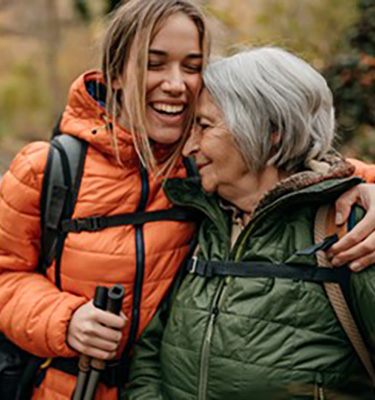5 health-boosting benefits of camping
July 29, 2025 | 6 min read
If you’re one of the millions of Canadians who takes a camping holiday every summer, you know how great it can feel to spend time in Canada’s outdoors. But it’s more than just a feeling – camping comes with added health benefits that over the long term, can boost longevity.
Spending time outdoors has long been linked to all sorts of positive health outcomes, including better heart health, lower blood pressure, improved mental health, and reduced stress.1 “We derive direct health benefits from engaging with the natural environment,” explains Dr. Steve Pomedli, a primary care physician at Cleveland Clinic Canada, which serves as the Medical Director for Manulife. Humans have innate biophilia,2 Dr. Pomedli adds, meaning that our bodies and our minds are not only drawn to nature, but primed to thrive in it.
Even better? Many common camping behaviours can help reduce our risk of chronic illness and contribute to a longer and healthier life.
Here are five ways that camping can improve your health, today and tomorrow.
Camping resets your body
Natural light is a key influence to maintain a healthy circadian rhythm — the internal clock that regulates sleep and wake cycles. Exposure to natural light throughout the day can improve sleep3 and improve mood.4 Short doses of sunlight also help boost Vitamin D, which supports the immune system, bone and brain health.5
With so much time spent in artificial light in schools, offices, and other work environments, we don’t always get the natural light we need. “This lack of exposure can throw off our physiological day-night rhythm and disrupt the natural timing of our circadian system,” Dr. Pomedli explains.
Camping is a great way to load up on natural light and recalibrate our natural clocks. And it doesn’t take much: Experts say that even a day or two of camping can significantly reset circadian rhythms.6 “Syncing your schedule with sunrise and sunset helps reestablish the proper timing of these internal patterns,” Dr. Pomedli says. “That has a positive impact on both physical and mental health, including more restorative sleep.”
Longevity link: Aligning your body’s clock to that of the sun can help reduce the risk of major health conditions linked to circadian misalignment, including diabetes,7 cardiovascular disease,8 and even cancer.9
Keep learning: Lessons in longevity: Expert tips for living a longer, better life.
Learn more about how the basics such as exercise, eating healthy and making time for friends can lead to a longer life.

Exercise happens naturally
“Being outdoors naturally encourages more movement,” says Dr. Marie-Claude Geoffroy, the lead researcher of the Open Sky School a collaborative project under the University of Montreal’s School of Public Health, which promotes youth mental health through nature. After all, there’s no time for couch rot when you’ve got a tent to pitch, gear to haul, and firewood to chop. “Whether it's walking, hiking, or setting up camp, we tend to be more active.”
And critically, none of it feels like a chore, says Dr. Pomedli. “Hiking often feels easier and more enjoyable in a natural environment compared to, say, 30 minutes on the treadmill,” he explains.
Longevity link: Healthy habits—including regular exercise—play a key role in preventing many chronic illnesses, and experts say we’re far more likely to stick to them when we find them fun.10 “When it's something you love, there’s less need to find extra motivation,” adds Elise Bourret, Manulife’s Global Head of Fund Services Operations at Manulife (and lifelong camping enthusiast). “You make time for it, and it feels rewarding in itself.”
Eating becomes more mindful
“Camping changes our relationship with food,” says Dr. Pomedli. “We often have to be more deliberate about buying and preparing everything ourselves, which is an opportunity to opt for healthy, simple, but delicious meals and snacks.” And mindful eating (without the usual distractions) has been shown to improve digestion, support weight management, and encourage healthier relationships with food.11
Longevity link: Experts say mindful eating tends to result in more nutritious choices and—over time—healthier food habits.11 Research suggests that eating well can help to prevent chronic conditions like heart disease and diabetes, while adding up to 10 years to our lifespans.
Related: Start to see healthy living differently
From petting animals to walking backwards, learn more about different ways to live healthier.

Camping clears your mind
A growing body of research suggests that activities that involve extended time in nature—including camping—benefit our mental health. “People tend to experience fewer symptoms of depression and anxiety,” Dr. Geoffroy explains. “There’s also a general boost in overall well-being and a notable decrease in feelings of loneliness.”
Dr. Geoffroy adds that children demonstrate less inattention and impulsivity when out in nature: According to a study she led for Open-Sky School, spending two hours a week in a natural environment can reduce emotional distress among tweens.12
What causes this mental calming? When we immerse ourselves in nature, our body produces less cortisol, the hormone associated with stress, Dr. Geoffroy says. And when we’re less bombarded with the stimuli of urban life—like cars, traffic lights, billboards, and screens—our cognitive load lightens, which relaxes our attention span. We’re physiologically more inclined to stop and smell the roses. “This shift creates space for a more meditative state of mind,” she says. “We start noticing the beauty around us—the shapes of the clouds, the scent of the forest, the sounds of birds. It fosters mindfulness almost effortlessly.”
Longevity link: Mindfulness doesn’t come naturally to everyone, but it’s worth pursuing activities that encourage it. Research suggests that people with “quieter” brains tend to live longer.13
Camping strengthens social bonds
While some folks love the solitude of a trip on their own, for most people, camping is a highly social activity, with plenty of face-to-face interactions and minimal screentime. “Nature often brings people together,” says Dr. Geoffroy. “We tend to talk more, co-operate more, and share tasks, which can strengthen social bonds.”
And experts say good hangs with friends or loved ones can play a big role in overall wellness. In fact, some believe it social connection should be prescribed to help prevent and treat a range of chronic conditions, including diabetes, cardiovascular disease, cancer, and depression.14 When we develop and tend to relationships in our lives, our brains release hormones that make us feel happier.15 We feel a greater sense of belonging and are better surrounded with emotional and practical supports to make healthier choices.16
Dr. Geoffroy has experienced this in her own life, during memorable camping trips with friends and family to some of Quebec’s most picturesque destinations. “Like many working parents, I live a hectic life,” she says. “Camping provides an opportunity to step back from the daily rush and reconnect with a simpler, more natural rhythm. It brings my family and friends closer together.”
Longevity link: A growing body of research links strong social connections with longer, better lives, and a number of studies have shown evidence that people with better social relationships have substantial improvements in longevity, compared to those who are more socially isolated.17
How to get the benefits of camping, minus the woods
You can get many of the benefits of being out in the wild in your own backyard—even if you live in a city. Your group benefits plan and other Manulife tools may be able to help:
- If you’re a group benefits member, check to see if your lifestyle spending account includes covering fees to join a team or club that meets regularly for outdoor activity, like a hiking group, a birding club, or a soccer team.
- Check if you have coverage to engage a registered dietician, who can help encourage more mindful eating habits.
This article is for informational purposes only. It is not intended to diagnose or treat a condition. If you have questions or concerns about your specific situation or are seeking medical advice, contact your medical doctor or your health-care provider.
Cleveland Clinic Canada
Manulife is proud to have Cleveland Clinic Canada on board as Medical Director for our Group Benefits operations. Cleveland Clinic Canada has a wealth of global healthcare expertise and shares our goal to help Canadians live longer, healthier, and better lives. Cleveland Clinic is a nonprofit organization that has been at the forefront of modern medicine since 1921. In recent years, Cleveland Clinic has worked with progressive companies in Canada and around the world to prioritize the health and well-being of their employees, customers, and communities.
Open-Sky School
A collaborative project under the University of Montreal's School of Public Health, Manulife's funding, in alignment with our Impact Agenda supports research testing the effectiveness of a school-based intervention involving outdoor education aimed at improving health and well-being in children – i.e. testing the relationship between exposures to nature and health. To learn more visit ecolecielouvert.ca/en/